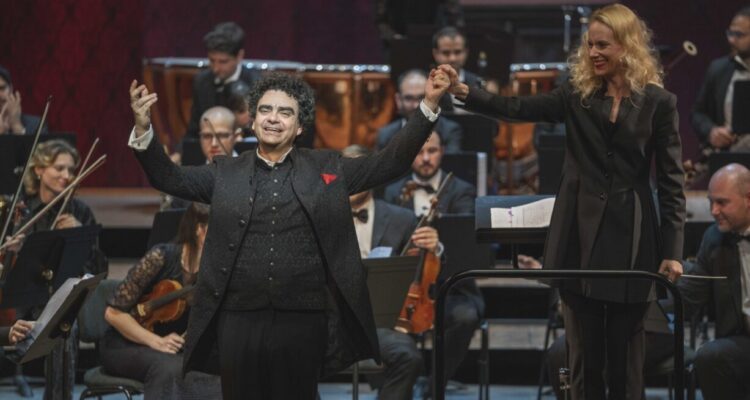Rolando Villazón, the Mexican tenor with big hair, big eyebrows and big heart, catapulted into the operatic scene, winning the zarazuela and audience prizes in Placido Domingo’s Operalia in 1999. Des Grieux (Manon) – Genoa 1999, Alfredo (La Traviata) in Paris and Macduff (Macbeth) in Berlin in 2000 quickly followed – ideal roles for a young tenor. Hoffman (Contes d’Hoffman) at the Royal Opera House in 2004 was his role and house debut. It is a role still close to his heart.
His nightmare started in 2007. His high notes cracked in Barcelona. Vitamins and rest did not work. He had stomach surgery for acid reflux and surgery in 2008 to remove a cyst in the vocal cords. He cautiously reappeared for concerts and opera in 2013, but was plagued with anxiety and self-doubt. His voice, so fearless, easy and natural until 2007, had to be retrained to sing in a different way. He abandoned Verdi and Puccini, turning to Baroque, but even then, felt uncomfortable in his middle register. He stopped singing, wrote novels, became the artistic head of the Salzburg Mozartwoche and directed productions. There he collaborated with Cecilia Bartoli. The brilliant GOAT Barber of Seville production starring Bartoli I reviewed from Monaco last year is his. Following another surgery, he slowly regained vocal stability. He returned to the Met as Papageno after an eight-year absence. Whereas most would have quit, Villazón’s charismatic energy and will-power took him through his crises to the Monte Carlo stage today. He now has a busy schedule.
Understandably, this was a hot ticket, sold out months in advance. How is the renewed 53-year-old Villazón?
The Swiss orchestra under Lena-Lisa Wüstendörfer starts the proceedings with an interesting Mozart-like overture from Ungdom og Galskap by Éduard du Puy. She intersperses Villazón with multiple crowd-pleasers such as the Méditation from Thaïs.
Villazón appears, looking dapper in black with a red handkerchief, to great applause. The planned repertoire is for a lyric tenor.
His first number is Bazajet’s aria from Handel’s Tamerlano. His voice no longer has the ringing top notes. He sounds more like a baritone than a tenor. He is going the way of Domingo. He does not have the seamless vocal jumps of Bartoli. He has sorted out his top-note angst. He found a different technique which looks effortful, but does not let him down. He is a convincing, charismatic performer.
His next aria, ‘Va, dal furor portata, was written by eight-year-old Mozart for tenor. It is a wonderful piece, and excellent training for young singers. Bartoli is the greatest coloratura mezzo in the world. Nobody singes coloratura like her. There are coloratura passages in this aria. Bartoli’s influence is clear by the way Villazón sings them. Orpheo’s aria from L’anima del filosofo follows. Both lie low in the voice. In both the low notes have unstable pitching. He finishes the first half with glorious lesser-known Verdi. Eight songs for tenor and orchestra are rousing. He choses not to sing the top note option at the end.
The second half starts with Hoffman’s Chanson de Kleinsach. This aria and chorus, despite being marvellous music, make me uncomfortable. It is the story of a deformed dwarf. Kleinsach’s legs go ‘clic clac’, his head goes ‘cric crac’. The singer acts this visually – it is mercilessly making fun. Extremely politically incorrect. Taken out of the context of the opera, I prefer not to hear this in a concert.
Torroba’s zarazuela ‘Amor, vida de mi vida’ and a lesser-known Puccini – ‘ad una morta’ follow. They are romantic pieces. He ends with Gastaldon’s wonderful ‘Musica Proibita’, taken a little too fast. It does not allow enough time for the phrases such as ‘vorrei baciar’ to have enough ritardando or to be sufficiently caressed. It is a lovely programme.
Thus ends the concert and begins the many encores. He uses his big eyebrows as an effective prop for his comedy skills. He sings Tosti’s ‘Ideale’ which lies too low and he jumps up an octave for the end finish. He brings the house down to tumultuous applause with his finale encore – a zarazuela, made famous by Domingo – ‘non puede ser’. It is rare for encores to last over 20 minutes, but Villazón loves performing and does not want to leave.
Everybody loves him. Nobody minds it is not the same voice. He is a terrific interpreter, stage animal and a genuinely lovely man. It is good to have him back.
24th February 2024
Conductor Lena-Lisa Wüstendörfer
Tenor Rolando Villazón
Photo Credit Marco Borelli
Swiss Orchestra
2 hours including interval and encores

